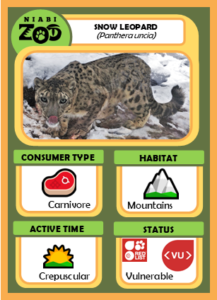Consumer Types
Animals are often categorized by the types of food they consume or eat. The names of these consumer types use the suffix -vore at the end of the word which means to eat or devour (from the Latin vorare). When combined with a prefix such as carn- (meat), herb- (plant), or omni- (all), the resulting word indicates the type of food the animal consumes.
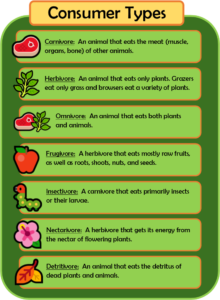
Active Times
The time during which an animal is active influences their behavior and physical adaptations. For example, some adaptations can overcome the low light levels of the night through more advanced hearing while others take advantage of the daylight with keen eyesight.
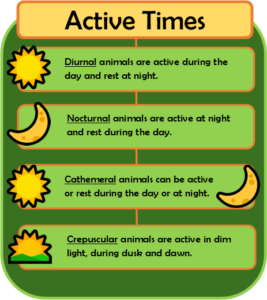
Habitats
An animal’s home or habitat influences the adaptations it develops in order to survive. A habitat includes all the resources an animal needs to survive including shelter and food, as well as the non-living (abiotic) factors such as water, climate, rocks, soil, etc. and the living (biotic) factors such as other animals, plants, bacteria, etc. that impact its life.
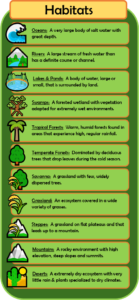
Conservation Status
The International Union for the Conservation of Nature (IUCN) is the organization that determines the conservation status of species based on population assessments which determine the chance of extinction for a species based on population trends in the past and those expected in the future. The status list below helps to identify the largest threats facing species as well as prioritizing where conservation action is needed the most. Learn more at IUCN Red List of Threatened Species.
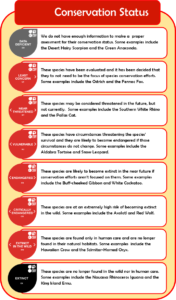
How can you help?
Here are ways that you can help conserve species and protect the habitats they call home.
- Participate to Protect– join in supportive events that help raise awareness about at-risk species and environmental efforts
- Don’t Support Import – wildlife trophies and wild caught exotic animals for the pet trade contribute to the decline of species populations
- Purchasing Power – buy sustainable products to prevent habitat loss and poaching
- Nation Education – learn about and support organizations doing in-country education to encourage local participation in conservation efforts
- Prohibit Poisons – pesticides affect more than the target, harming many other species
- Enjoy Ecotourism – explore natural areas when you travel to support its protection
- Give to Live – fund conservation organizations and zoos to protect species in the wild
- Help at Home – You can help protect species and habitats at home by
- Reduce your use of single use plastics
- Decrease your carbon footprint
- Plant a pollinator friendly garden


